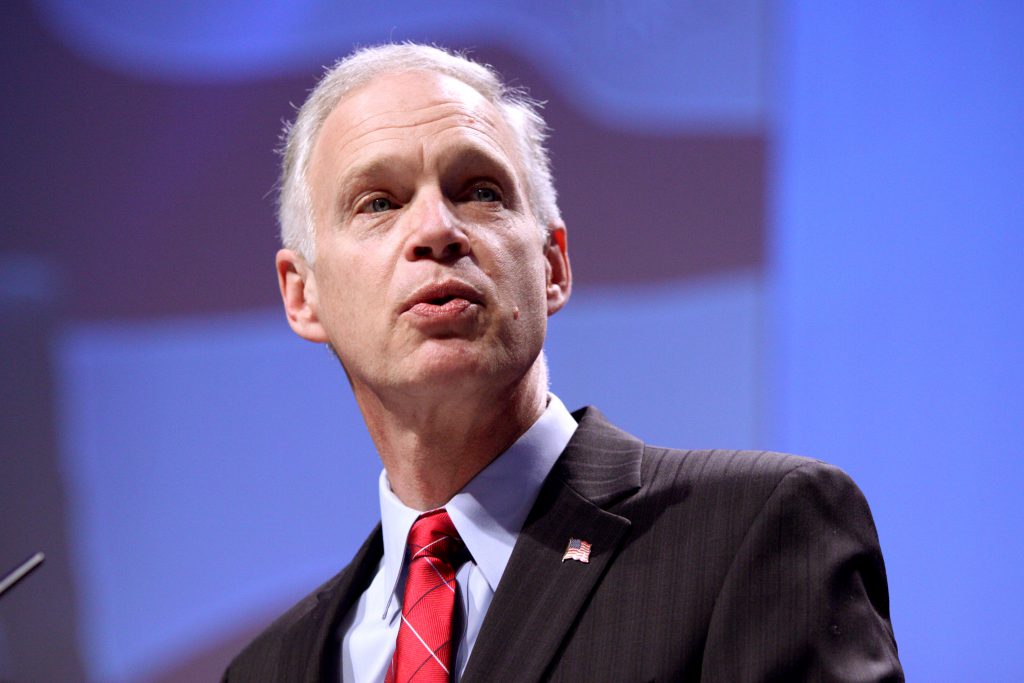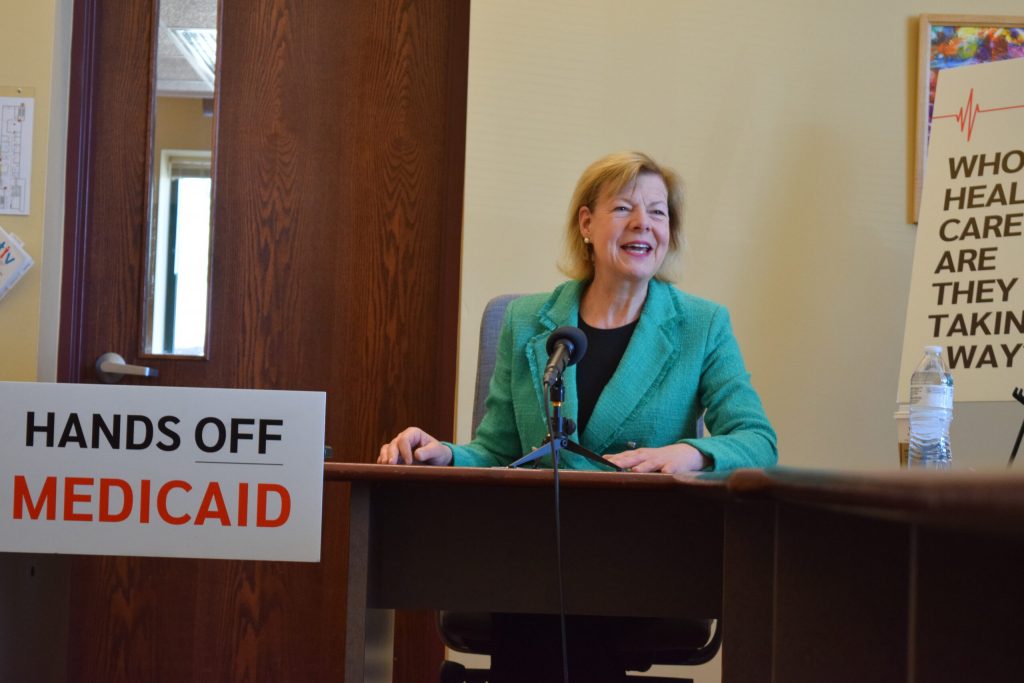Wisconsin Sen. Ron Johnson Blasts Budget Bill, Rising National Debt
Backs hundreds of billions in federal cuts, saying only 'grifters' would be affected.

Ron Johnson. Photo by Gage Skidmore from Peoria, AZ, United States of America / Attribution-ShareAlike 2.0 Generic (CC BY-SA 2.0)
Republican Sen. Ron Johnson remains opposed to a massive budget bill in Congress, telling WPR he wants to see larger spending cuts and an extension of federal tax cuts.
Two weeks ago, the U.S. House of Representatives passed the budget reconciliation bill called the “One Big Beautiful Bill Act.” After an all-night session, it passed by just one vote, 215 to 214.
But a handful of Republican senators, including Johnson, say they plan to vote “no” on the budget package if there aren’t additional cuts to reduce spending. He joined WPR’s “Wisconsin Today” to discuss his concerns about the bill.
Top concern is national debt
Johnson is a fiscal hawk who has described himself as “more Tea Party than Republican.” He is concerned about the more than $4 trillion the bill proposes to add to the debt ceiling.
“I think the lack of focusing on the facts and figures during the House passage is the first thing we need to address,” Johnson said.
He said today’s Congressional spending levels are “unprecedented.”
“[Former President Joe] Biden averaged deficits of $1.9 trillion, and that’s our starting point. That’s apparently the new normal. I’m not accepting a new normal, and unfortunately, the ‘Big Beautiful Bill’ pretty well accepts that new normal,” Johnson said.
“We have to return to a reasonable pre-pandemic level of spending,” he added.
During Trump’s first term, the national debt rose by almost $7.8 trillion, including about $3 trillion for COVID-19 relief spending. Biden oversaw another $8.4 trillion added to the debt.
Reducing spending
When asked about where he would like to see the cuts made, Johnson did not list any specific programs or budget lines he thinks should be reduced.
“You have to go through every line of the federal budget,” he said. “You have to forensically audit over 2,600 federal government programs.”
Johnson claimed that “if you put the spending under a microscope, there would literally be hundreds of billions of dollars throughout the federal budget that if you eliminate it, nobody would even notice, other than the grifters who are sucking down the waste, fraud and abuse.”
Elon Musk’s Department of Government Efficiency, or DOGE, has popularized the phrase “waste, fraud and abuse.” After several months of slashing federal programs and initiating mass layoffs of the federal workforce, DOGE estimated that it saved the government $180 billion — a number that analysts say is likely an overestimation.

U.S. Sen. Tammy Baldwin, D-Wisconsin, has strongly opposed cuts to Medicaid. She met with Wisconsinites who rely on Medicaid services for themselves or their families during an event in La Crosse on Monday, March 17, 2025. Hope Kirwan/WPR
Impacts of SNAP and Medicaid cuts
Democrats, and some Republicans, have expressed concerns about cuts to food assistance and health coverage programs that their constituents rely on. Johnson chalked this up to “rhetoric” and “fear-mongering.”
An independent analysis by the Joint Economic Committee estimates that between Affordable Care Act coverage and Medicaid, more than 220,000 Wisconsin residents will lose health insurance coverage if the bill passes in its current form.
What about the tax breaks?
The “Big Beautiful Bill” extends Trump’s sweeping tax cuts from 2017. When asked if he would be willing to forgo these tax cuts to help balance the budget, Johnson said no.
“No, I do not want to increase anybody’s taxes,” he said.
In 2024, tax revenues were 16.6 percent of U.S. gross domestic product, according to the economic firm CEIC Data. Johnson said that this is right around the 50-year average of 17.4 percent.
“We need to recognize that reality, and we have to start bringing spending back in line with that,” he said. “You can try punishing success. It just doesn’t work.”
AI provision in the budget bill
The bill also includes a provision keeping states from regulating artificial intelligence technology for 10 years. Three Wisconsin lawmakers — two Republicans and a Democrat — recently signed a letter to Congress opposing this moratorium on regulating AI.
“I don’t like it because it hasn’t been discussed. It hasn’t been debated,” Johnson said. “This is an incredibly complex issue, AI.”
Johnson said that he is using AI to do a sensitivity analysis on the projections from the Congressional Budget Office as part of the larger budget debate.
Johnson said that he’s not in favor of including policy issues in the budget bill, which is meant to focus on fiscal matters.
“I doubt this is going to survive the Byrd bath,” Johnson said, referring to the Byrd Rule, which limits what kinds of items can be included in budget reconciliation legislation. “I don’t understand what the budgetary impact of that (AI provision) would be at all.”
Wisconsin Sen. Ron Johnson says he doesn’t accept the ‘new normal’ of rising national debt was originally published by Wisconsin Public Radio.
If you think stories like this are important, become a member of Urban Milwaukee and help support real, independent journalism. Plus you get some cool added benefits.





















How is Johnson a “fiscal hawk”? Does he want to cut defense spending? Does he want to raise taxes ? Does he want to stop being a Russian asset? No, no, and no.
A majority of Americans and a majority of current day “Republican” voters want three things from the federal budget: 1) a simpler tax code; 2) less debt, and 3) higher actual taxes paid by the rich.
This bill does exactly the opposite of all 3 of those things. It’s a sad day when only a couple congresspeople and a few senators are willing to agree with a majority of Americans, even in their own party.
We have to reduce the national debt. The interest we (taxpayers) are paying on the national debt is money wasted. The interest paid on the national debt buys nothing. Interest payments don’t improve roads, national defense, libraries, education, . . . Interest payments (unless paid to the Social Security Trust Fund) are taxpayer dollars going to nothing.
There is A LOT OF WASTE IN DEFENSE SPENDING. We give full retirement to officers convicted in federal court of accepting bribes while on active duty. Why do we keep raising the pay for junior enlisted Soldiers? I understand that a private can’t afford a wife and children. A private should be happy with good food, a good place to live, and the potential of moving up in the ranks to a rank where he can afford a family. The President is wise to utilize the military to enhance border security. We’re already paying the military.
I can afford to pay a little more in taxes. I like the idea of Apple making their phones in the US or paying a 25% tax on imported phones. Money from tariffs could be used to help pay down the debt.
What is the cost savings of placing one or two aircraft carriers into a caretaker status? What about reducing the pay of junior Soldiers on a two-year enlistment? We need to get into the weeds, a few hundred thousand here and there, and you have a million saved.
I appreciate Senator Johnson for saying something about reducing the deficit. I would appreciate him more if he would start looking at the waste and reduce the military retirement for those who committed crimes while on active duty, or military-related crimes after retirement. I’m not saying take all their retirement away – but reduce their retirement by a few grades.
Reviewing all retirements and reducing retired pay for officers with criminal convictions or relief for cause